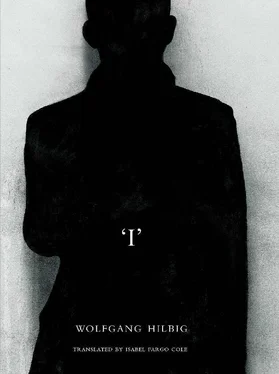Maybe not here, though, over there. . I replied.
Keep your mouth shut, for Chrissake! Or do you have a pile of dough in the vaults of the Commerzbank already too?
(In the morning he woke in the dark airless room, the blind closed, and immediately sensed that Frau Falbe was in the room. Instead of raising the blind she turned the light on, she was wearing the robe she always kept on until afternoon; after a while — he was still drugged with sleep — she repeated last evening’s lament: He wouldn’t come any more now, once he’d taken the armchair away! — What does the armchair have to do with it? he asked. — Well, it had been her husband’s chair, her last recollection, she didn’t even have a picture of him. — Should I leave the chair here? he asked. — No, that’s not it. . I never would have given it away, but you. . you can have it. — Straightening up, he said he still didn’t understand her. — With you I’m not so afraid some other woman will sit in the chair. I wasn’t afraid of that with my husband, either. . at least not while he was still here. And you’re just like my husband. You know the sort he was. .—C. had feared she’d say: You work for the same firm as my husband. . And all at once he was wide awake. Then it struck him that that rough undertone he knew so well had crept into her voice again. — She came closer and sat on the edge of the cot beside him: He was a thinking man, my husband was. . it was awful, what he was constantly thinking up. He always did his thinking in the armchair, and you do just the same. . and then one time I caught him! — Thinking? he asked. — Can’t you see what I mean? Of course he was. . She hesitated: Of course he was jerking off ! — She almost gasped out the words, as though they called up an image that made her shudder: I’d known he was doing it for a long time. . I wanted to catch him in the act and confront him about it. — And what did he say? — It was awful! she replied. Awful for him, apparently. . not for me.—C. looked at her questioningly, and she explained, her voice still rough: Or maybe it was dumb, what he said? This puts us in the opposition, he said, ’cause for us they’re all jerk-offs, the people in the opposition. And then. . then he wanted me to do it too. — And did you do it? asked C. — If I show you, you’ll always remember me when you sit in the armchair. .
She’d shed her clothes and sat in the armchair with her thighs draped over the armrests. With surprisingly adept, almost elegant movements she began to stroke herself between the legs, first moistening the fingertips of her right hand at her lips, her left hand behind her back, between her thrusting body and the back of the chair, as though attempting to facilitate the difficult jerky movements of her pelvis which strained towards the rubbing fingers of the other hand — as though these fingers were a touch too incompliant with the opened lap. Words escaped her, almost cries, held back in her breast with an effort: You’ll remember. . you’ll always remember! — Unexpectedly, for the first time since C. had known her, she had switched to the informal ‘you’.
And in the midst of her excited movements she suddenly clutched a piece of paper in the fingers of the hand behind her back; she had pulled it apparently unintentionally from the crack between the chair cushions, where still more were hid. .)
She must have sensed that something prevented me from becoming fully or even very closely involved with her. . and it wasn’t just the shabby room that was uninhabitable in the winter. She’d got used to the fact that I had the other flat, but even in the warm months now I spent fewer and fewer nights at her place, I couldn’t say myself exactly why. — I had failed at my plan: to use the room to work on my literary texts. . and besides, I suddenly suspected her of searching my papers in my absence. . probably she’d been wondering for some time who this student might be; fortunately I had always made sure that all incriminating passages (about my relationship to the Firm) disappeared from my desk when I left. The room was useless as a hiding place (of course Feuerbach could easily find it out). . no hiding place was any use to me, my talent for writing poems had gone so deep into hiding that I’d almost forgotten about it. — As I heaved the armchair onto a borrowed wheelbarrow, Frau Falbe watched with a look of such alarm and confusion that I promised to come back as soon as possible. . Some time this week for sure! I said. — It was clear that she didn’t believe me. . You know you can have the room any time, she said. — I had no idea how soon I’d be forced to take her up on the offer.
Ever since that spring I’d been unable to shake the feeling that Feuerbach was trying to avoid running into me — I’d never felt quite at ease in his presence but now I felt still more unnerved. — What could I do. . sit down and ponder vanishing entirely. . or behaving still more suspiciously (which strictly speaking was the same thing. . just as pursuer and pursued could switch roles abruptly, and without changing in their essence). . should I behave even more provocatively? Provoking the Scene and the Firm simultaneously — news of the little chase scene between me and the student had to have got around. . but no, it didn’t happen, I was living in a simulation, in a land full of simulated logic. — Someone ought to have thrown me out after the incident with the student, either the Scene or the Firm! Clearly I wasn’t a proper UnCol, either for the Scene or for the Firm. .
It was as though the very chairs I tried to sit on dodged me (my beautiful red armchair, for instance). . as though the void I moved in made all deliberation impossible, providing no more reference points I might have proceeded from. It was something like what a person suddenly released to West Germany had to feel: there was everything over there, and so there was nothing. . nothing but politely smiling bureaucracies that expected nothing from you and failed to grasp that you expected something from them. — What should I do?. . I compared myself to a spider suddenly lacking the ability to weave its web — and indeed I felt that all the strands of information and counter-information spun around me had torn. I was no longer informed about myself (no one informed me about myself any more!), and this was perhaps the most pathetic thing about my condition. — Information, I told myself, had been my home. Suddenly it unravelled like a spider’s biotope. . it unravelled and disappeared like a whole society, the one that sustained me. — And even my means of articulation were unravelling and atrophying; I had the impression that I’d spent an entire year using nothing but the sketchiest of auxiliary verbs: What is. . what was. . what will be. . what did we have to be?
Sometimes I hoped to gain a sense of stability from those I’d once sought out, as a rule, ‘on official business’; I was forced to realize that I was barely known as a writer any more. Again and again I’d had to reply in the negative when asked if I had new poems. . I claimed to be collecting my thoughts, which evidently was too classic a phrase for them. I hardly ever got invitations any more; those hectographed sheets with the purple, barely legible, hand- or typewritten avant-garde monstrosities of syntax no longer turned up in my postbox. . though I also thought it possible that someone was removing them. My visits to the Scene were hit or miss, often inopportune; once again I was the tiresome literary hanger-on I’d been before my seventeen poems were published. . only that then living in the small town had prevented me from making unannounced visits, usually lasting half an hour, but sometimes one or two, during which I was silent or asked stupid questions: What’s happening? What’s going to happen? How’s it going, who are you, who else have we got here?
Читать дальше












